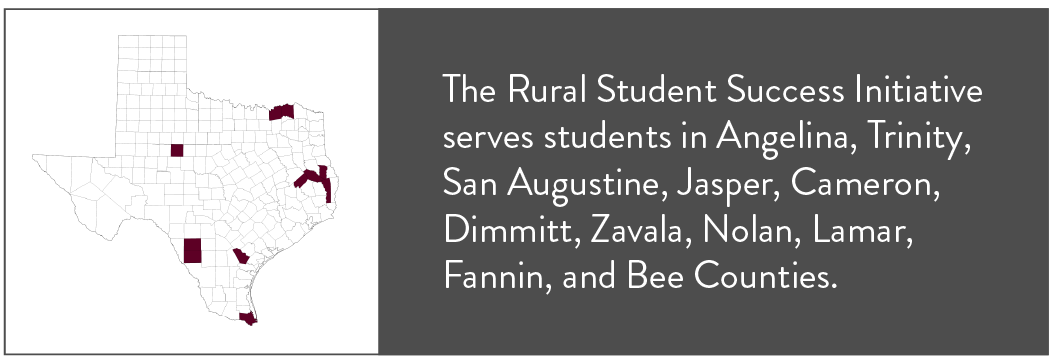| |
RURAL STUDENT SUCCESS INITIATIVE
In January 2017, Greater Texas Foundation supported the Texas A&M Foundation in a three-month planning period to explore the needs of rural students regarding college access and success. Based on findings from this research, the Texas A&M Foundation partnered with the Texas A&M AgriLife Extension Service, College Forward, and the National College Access Network to develop the Rural Student Success Initiative. GTF committed to funding this innovative work for three years beginning in September 2017. Maria Luna-Torres, director of the initiative, reports on the partnership’s early successes.

With support from Greater Texas Foundation and the T.L.L. Temple Foundation, the Texas A&M AgriLife Extension Service launched a major rural student success demonstration project in eleven Texas counties. The goal of the AgriLife Extension Rural Student Success Initiative (RSSI) is to increase the number of rural students enrolling in and completing a postsecondary certificate or degree program.
The number of rural students in Texas is indisputably large and estimated to represent more than 900,000 students in the state’s K-12 education system. This population of students is widely dispersed across many of the state’s small- to medium-sized school districts. Rural students and parents can often feel isolated with less access to college planning tools, resources, and support. In fact, students in rural regions are less likely to attempt and complete a postsecondary credential than their urban peers.
To help address this challenge and provide enhanced supports to rural students, the project capitalizes on Texas A&M AgriLife’s statewide network of county extension agents, and specifically their strong ties to their communities and youth development platform. AgriLife serves every county in Texas through agents working out of 250 offices statewide. County extension agents have an established credibility with the area’s youth and families, who are also served by the local school districts in their respective counties.
In the first phase of the project, Texas A&M AgriLife, in collaboration with its partners National College Access Network (NCAN) and College Forward, worked with the pilot rural school districts to lay the foundation for this initiative in Fall 2018. Securing participation and leveraging resources from local members is key to the success of this project, as it takes more than just the education system to get students on a path toward college.
As part of the planning stage, county extension agents were instrumental in forming local advisory committees. Along with the county extension agent, rural school leaders, local business/city government officials, and students’ parents/guardians are among the education stakeholders driving the work of this initiative. This community approach, coupled with support from the two leading college access organizations—NCAN and College Forward—is enabling local members to develop action plans. County extension agents will work closely with their local school district to operationalize strategies and develop a plan that is grounded in evidence-based college access practices. Mindful of the regional differences in the pilot school districts, programming will vary to ensure action plans are relevant and tailored to the needs of rural students in their respective counties.
To jump-start the project, Texas A&M AgriLife hosted its first kick-off training in early June. Pilot school districts along with their county agents learned how to incorporate College Forward’s student and parent support curriculum framework and data system into their workplans for maximum impact. Also, school counselors had an opportunity to learn about NCAN’s e-learning platform. NCAN’s college access platform provides schools a wealth of resources and a wide range of professional development options on college preparation topics, including FAFSA filing, admissions applications, and career advising.
As planning continues to unfold, Texas A&M AgriLife and its partners will continue to cultivate school and community partnerships in the rural areas served by this initiative. Long-term project goals include identifying new opportunities to scale this effort to additional rural areas in the state. Leveraging resources among organizations committed to college access will maximize successful postsecondary outcomes for rural school districts and their students. Most importantly, the Rural Student Success Initiative will contribute to the state’s long-range postsecondary completion goal of producing a highly educated and skilled workforce in Texas. |
|